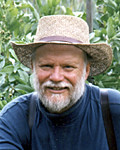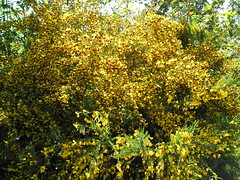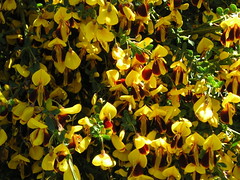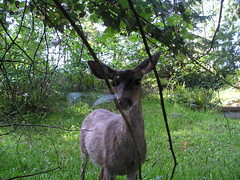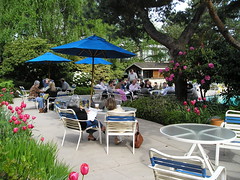In the December 2003 issue of Fast Company, there was a tremendous article by rock-climber and management writer and thinker Jim Collins on the difference between failure and fallure and how we make mistakes in calculating risk. First on failure and fallure...
"Off!" I called down to Matt.
"No," he yelled back. "You're only three moves from the crystal. You can recover there."
"OFF!" I yelled.
And I let go, dropping onto the rope in a nicely controlled fall.
I hung on the rope for about 10 minutes, recovering, and then swung toward the rock, pulled myself back on to the holds, and climbed to the top. But of course, it didn't count. I hadn't done a clean on-sight. And even though later in the day, I managed to ascend the route from bottom to top in one shot--a success by most measures--I had nonetheless failed. Not failed on the climb, but failed in my mind. When confronted with the moment of commitment, the moment of decision, the moment of go-for-it on the on-sight, well, I let go. I went to failure, not
"fallure."Failure and fallure. The difference is subtle, but it is all the difference in the world. In fallure, you still do not get up the route, but you never let go. In fallure you fall; in failure you let go. Going to fallure means full commitment to go up--even if the odds of success are less than 20%, 10%, or even 5%. You leave nothing in reserve, no mental or physical resource untapped. In fallure, you never give yourself a psychological out: "Well, I didn't really give it everything. . . . I might have made it with my best effort." In fallure, you always give your full best--despite the fear, pain, lactic acid, and uncertainty. To the outside observer, failure and fallure look similar (you fly through the air in both cases), but the inner experience of fallure is totally different from that of failure.
You'll only find your true limit when you go to fallure, not failure. Sure, I had less than a 20% chance of pulling through to the crystal ball, but because I let go, I'll never know for sure. Perhaps I would have had an extra reserve; perhaps I would have surprised myself and had an extra bit of power to hang on for one more move. Or perhaps--and this turned out to be true--the very next hold is better than it looks. And that's the rub. On an on-sight--as with life--you don't know what the next hold feels like. It's the ambiguity--about the holds, the moves, the ability to clip the rope--that makes 100% commitment on an on-sight so difficult.
One of my mentors in life, the design guru Sara Little Turnbull, gave me a wall hanging with a quote from her speech at the 1992 Corporate Design Foundation Conference:
If you don't Stretch
You don't know
Where the edge Is
I now see life as a series of choices between going to failure or fallure. As in an on-sight attempt, the next hold in life remains unclear, ambiguous. And that very ambiguity keeps us back from making a fully committed attempt. We fail mentally. We let go. We take a nice, controlled fall, rather than risking a bigger fall. But as with most hard sport climbs, going to fallure in life is scary, but not dangerous. Whether it be starting a business or publishing a book or trying an exciting new design, fallure rarely means doom. And most important, the only way to find your true limit is to go to fallure, not failure.
I find it interesting, as we contemplate going to fallure in our own lives, how often I end up in conversations about planning to avoid risk, about what more information we need, about how much knowlegde will make it okay or 'not stupid' to take a risk. Very seldom do we sink as much energy into talking about the risks we take by not committing to what matters--to what has heart and meaning. The fear of what is essentially unknowable has the power to keep us living smaller lives, to keep us hemmed in the safe, tame places away from our potential, our deepest joy, our most creative and fulfilled selves.
In North America, as compared to most of the rest of the world, we have belay lines, we have safety nets. I am wondering how this padding, this obssession with safety and control, has affected our capacity to commit to ourselves and our lives. We bleed our life energy out in exchange for cash to pay for safety--and even to pay for insurance on the safety. We are focused on risk and we pay almost no attention to consequence.
More from Jim Collins:
Separating probability from consequences is a key to leading an entrepreneurial life. When I taught at the Stanford Graduate School of Business, many of my students failed to grasp this distinction, and it limited their options. One came to my office and said, "I'd really like to start my own company, but it
just seems so risky, so I'm going to take a job with IBM."
"What would happen if you give your startup the full try and failed?" I asked.
"I suppose I would go and get a job," she said.
"And how hard would that be?"
"Not very hard."
"So you're telling me that the worst-case scenario is that you'd be right back where you are now: looking at getting a regular job."
For a Stanford MBA, trying a startup was like going to fallure on a well-bolted sport route. Sure, the odds of success were low, but the consequences of falling were minimal. The rope would catch her. She went out on her own, gave it the full effort, and managed to climb through and build a successful startup. But she would never have known that if she had not separated probability from consequence.
The point here is to be clear on the difference between probability and consequence, and to act accordingly. On dangerous routes (or life situations that would destroy you or your company), you should avoid climbing to fallure, no matter how difficult or easy the terrain, unless you have no other choice. On sport routes with big, solid bolts (like Crystal Ball,
or the startup venture of my student), you can take on difficult challenges with a 5% chance of success and throw yourself into full fallure mode. It might be scary, but it's not dangerous.
I am wondering how many of us in North America can really even tell the difference between scary and dangerous. I had an Irish friend remark to me one day, "Hey there aren't any bullets flying...we're doing okay." And when I think of what we consider poverty and how depressed, isolated and frozen it can make us and then compare it to what is experienced by most of the rest of humanity--I get this energizing shock of perspective. I have begun to think that we are so insulated by our culture of entitlement that we have surrendered our basic human capacity--and desire even--to fend for ourselves. The urge to test, to see if we can measure up to what life throws at us--the inner urge to true maturity and adulthood. And there is something here too about a connection to the earth--about nature. I am thinking about the practice of walkabout and vision quest and how they are an essential part of becoming an adult. The exercise of self-reliance and the self-knowledge that arises from it. How many of us have had the conscious experience of holding our own lives in our hands--of knowing that we and we alone have the capacity to shape them into works of beauty and power?
A last word from Jim Collins:
And in perhaps the biggest failure, we allow today's frame of mind to limit our creativity and capabilities. What we perceive as limits today will simply be viewed as stepping-stones to the ultimate limits of the next generation. So, why not join the next generation now, and step right on past the limits of today? Why wait?
Daniel Boorstin argued in his classic book The Discoverers (Random House, 1985) that the primary barrier to progress is not ignorance but the illusion of knowledge and expertise. Discoverers see more clearly what can be done because they have less knowledge about the way things are supposed to work and are not trapped by the limits of their times. Similarly, climbing teaches that breakthroughs come not primarily by changing what we do, but by changing first and foremost how we think about what we do. And that is the toughest climb of all.
Love and G'night all...
